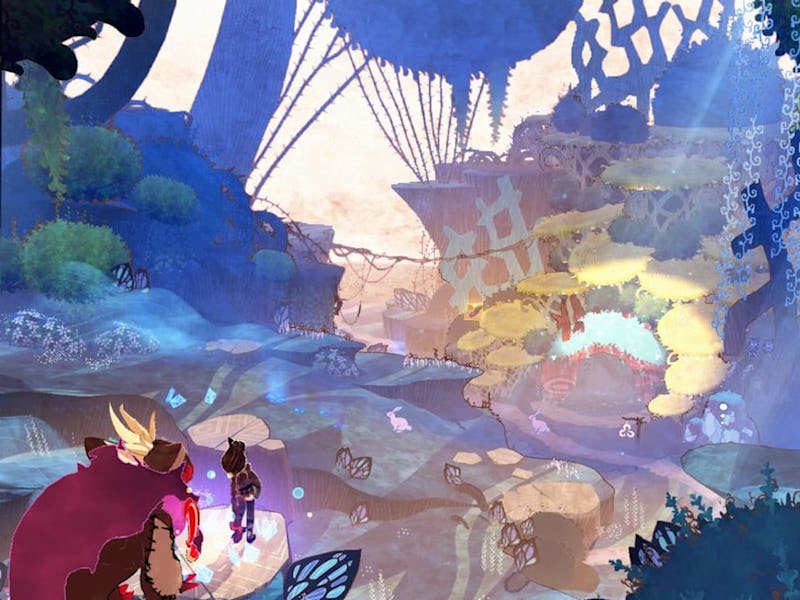Bayonetta Origins Has a Storytelling Gimmick More Games Should Steal
Once upon a time.

Family-friendly is not something one expects to hear when talking about Bayonetta. The beloved witch is known for her domineering attitude, revealing style, and suggestive humor. Yet Bayonetta Origins: Cereza and the Lost Demon, a surprise prequel from PlatinumGames, might be the most surprising family game to come out in 2023. A highlight of the game is the use of a narrator, which instills a sense of childlike wonder in anyone who plays Bayonetta Origins.
You have to do the voices — Every good fairy tale needs a good narrator. Bayonetta Origins has a great narrator. Narratively presented as playing through the pages of a storybook, the game eschews traditional cutscenes with storybook-illustrated freeze-frames of Cereza and the events she finds herself in alongside short bursts of text, all of which are narrated.
Bayonetta Origins clearly takes inspiration from traditional fairy tales, but the joy of the narrator is that the game also revels in the art of storytelling itself. While the narrator is an enjoyable mechanic from the start, it truly shines at the introduction of the second titular protagonist: the lost demon Cheshire.
The storybook pages distinguish the fearsome demon’s dialogue in italics, and when the narrator reaches this part of the text they put on a distinct voice for the new character. Like any good story time when I was a child, or the best audiobook readings today, Bayonetta Origins’ narrator commits fully to the role and launches into a joyously imaginative portrayal of Cheshire.
While the idea of the narrator could seem gimmicky, it instead feels truly inventive. It asks the player to join in on the fun of this colorful fairy tale world.
Story-time — In every piece of media we consume there is usually some level of suspension of disbelief. Video games can have absurd magic, and supernatural plots, and be rooted in incredibly gamified tasks, but that is the nature of the medium to an extent.
Bayonetta Origins' storybook style and tone are a welcome new direction for the series.
As an audience, we agree to wave away some of that absurdity in order to immerse ourselves in the world of the game. The trick of Bayonetta Origins is that it asks us to acknowledge the absurdity and reframe our interaction with the game as a piece of collective theatre and storytelling.
Going into Bayonetta Origins, most people who pick up the game will already be familiar with the witch that Cereza grows up to become. The impression of a fairy tale is that the reader typically knows how the story comes to a close. While we don’t know how Bayonetta Origins will end, we do know where this little witch goes next.
Narration in games is rarely implemented to such great effect. Other games like Bastion and Divinity: Original Sin II implement this with wonderful results, but the distinct childlike joy that comes with Bayonetta Origins' narrator feels like nothing else in video games.
Even though the vibrant watercolor environments and characters that populate the pages of Bayonetta Origins can accomplish the task of effectively displaying this fantastical world to the player, a job that a skillful narrator would usually be responsible for when reading a fairy tale, the narrator still remains.
Bayonetta Origins is a stylistic, tonal, and mechanical departure from the franchise it acts as a prequel to. While Cereza clearly has the seeds that grow into the witty and authoritative Bayonetta, it would not be surprising if the connection was completely missed. Though that isn’t a bad thing thanks to how enjoyable Bayonetta Origins is to spend time in, especially when you have the narrator to entice you deeper into the story.
Bayonetta Origins: Cereza and the Lost Demon releases for Nintendo Switch on March 17, 2023.